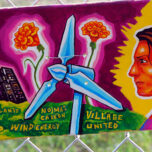July 2, 2013 — In 2004, Michael Shellenberger and Ted Nordhaus wrote their now-famous scathing commentary, “The Death of Environmentalism,” which exposed the various flaws they saw within environmental organizations and the movement as a whole. “We believe that the environmental movement’s foundational concepts, its methods for framing legislative proposals, and its very institutions are outmoded. Today environmentalism is just another special interest,” they wrote. Eight years later, Bill Ulfelder, executive director of The Nature Conservancy in New York, added to the conversation, telling Grist that an average TNC member is a 62-year-old, white, college-educated person who makes $75,000 a year. When I take a look around at whose voices are advocating in Congress or pleading with the American people to act on our grand environmental challenges, the faces looking back at me more often than not match that description — and, I’ll add, are mostly male.
I don’t fit most of those categories. I am a millennial Latina woman. I believe in finding solutions to fix these problems. But I am literally in the minority.
The environmental movement needs reviving, and the diverse voices of women, people of color, low-income individuals and those with disabilities can do just that. Granted, the times have changed and organizations such as Greening Forward — a young environmental group whose CEO, Charles Orgbon, is 17 years old and African-American — are beginning to fill the void of diverse voices. But Orgbon is an outlier. Just as Shellenberger and Nordhaus argued almost a decade ago, environmentalism is once again in danger of becoming irrelevant if membership to its ranks remains — intentionally or otherwise — exclusive. Bringing together a diverse group of voices and perspectives is paramount if we are to avoid this. But, where do we even begin?
As a Hispanic individual who grew up in a Spanish-speaking environment, I see disseminating information in multiple languages as one way to engage a broader audience.
We start with what we know, and what I know is my story. Nature has always been a part of my life, but it wasn’t until the summer of 2007 that I had a lasting experience with nature. I was 16 years old and on my way to New Jersey to participate in TNC’s Leaders in Environmental Action for the Future program. That summer, spent doing trail work on nature preserves, performing outreach work with the community of Vineland, and banding osprey, altered my life in ways that continue today. Climbing a 12-foot ladder, looking straight into the eyes of a black and white osprey (with sharp talons!), and helping band it to ensure its survival was remarkable, but it wasn’t until I returned to New York City and found nature in my everyday life that I knew a lifetime passion for the environment lay ahead. Six years later I write this as a proud environmentalist looking to pursue a career as an environmental journalist advocating for nature.
But as I’ve gone down this path, I’ve realized there are very few people like me who truly care about the environmental movement. Sure, we have highly mobilized groups filled with young people that can support divestment or protest the Keystone XL pipeline, but there are very few people of color in those efforts. Notable figures like Van Jones or Vandana Shiva are, like Orgbon, outliers in the greater environmentalism context. Because of this, I believe the environmental movement has already failed. It has failed us, those whose voices have been left out from the beginning.
There are countless stories of environmental injustices all around us, such as those of predominately poor families and families of color who suffer increased rates of asthma and other respiratory illnesses because they live near factories or power plants. Or the fact that farmer’s markets are exclusive to middle class, predominately white individuals because they are too far away from those who live in food deserts or they don’t accept food stamps. Then there are the stories of NIMBY-ism (Not in My Back Yard), where poor communities are forced to bear the brunt of environmentally taxing development, such as that of the Cross Bronx Expressway, which today slices through neighborhoods of the South Bronx because opposition in the more affluent parts of Manhattan apparently made an expressway there impossible.
In such cases, the environmental movement’s actions are often admirable, but inadequate — focused on ways to prevent future harm, but too often failing to engage with and include in the process the people who live (or used to live) in the affected areas. 
Related Posts
Ensia shares solutions-focused stories free of charge through our online magazine and partner media. That means audiences around the world have ready access to stories that can — and do — help them shape a better future. If you value our work, please show your support today.
Yes, I'll support Ensia!




I recently went to a workshop at the U for the Twin Cities Women in Sustainability - and the speakers showcased the various programs at the U working on Sustainability - a large number of which were outside of the U.S. While I'm not against helping people in other countries, we have significant enough issues here that are not being adequately addressed.
Take, for instance, the vast food deserts in North Minneapolis. Coalitions of local residents there are now being built to support creation of sustainable food systems but it would seem the U could do more.
I am working to bring voices together from all backgrounds and would love to talk with you about how to engage those that have so far been mostly outside the conversation. I'm building a platform for local online engagement at SustainingCommunity.org.
Now let's unpack this statement.
This means from a young age, teaching kids about the nature in their everyday world. Heard of nature deficit disorder? To combat NDD, we must move kids away from the technology and teach them about their local flora & fauna. Nature should not be on a placed on a pedestal. It can exist both on as a street tree & in the Adirondacks.
But I digress.
Other solutions include programs spearheaded by big organizations like The Nature Conservancy's LEAF program or creating diverse conversations through social communities like http://www.outdoorafro.com/.
What we need to really do is reinvent the idea of what it means to be an environmentalist. Do you like the world around you, like clean water or nice air to breathe? Then yes, you are an environmentalist.
Karlie, the U can certainly do more to make these links. There are programs that didn't get called out in the workshop you attended: HECUA, the Urban Research and Outreach Center and the District Alliance have ties to Minneapolis neighorhoods and may be interested in your new online engagement platform.
We no longer talk about just defending nature or preserving something. We talk about a holistic vision for the new, sustainable society. Environmentalists are still there, but only a part of the picture. http://ufbutv.com/2012/08/23/the-sustainable-society-of-2040/
I see the world's ecology from an ecocommerce perspective; one which ecology and economy are integrated. I'm logical and cannot see a solution that does not tap into the symbiosis of nature and the self-interests of people.
I am not an environmentalist. I am an ecocommercist.
I agree with much of what Ann Marie writes and lately have warned the groups I work with that having more participants qualified for SS than not is not a healthy mix.
But the Atlantic Chapter (New York) Sierra Club actually has a dominance of female leadership as do most of its groups.
With any large organization that grew from grass roots the Sierra has developed into a gigantic bureaucracy that is forced to work within large frameworks that do deny being sensitive to finer points of subtlety and special categories but the challenges are generally even larger frameworks.
I think the young often seek more immediate action and relief than reality can provide. But they often form splinter groups to satisfy the need for quicker action and energy gets squandered and the effort eventually abandoned.
Nearly all environmental effort is derived from a love of nature. We nearly all pay special attention to one aspect more than others. Mine is Water.
So the young with energy share a love of special areas with we the old. We must find a way to bridge the gap and harness the energy before it gets dissipated.
And hopefully on Ensia down the road.
Plastic Pollution is considered one of the largest environmental threats to all people and animals and we need to educate the next generation of leaders about how they can be the solution to the issue of plastic pollution:
http://onemoregeneration.org/educational-program-info/